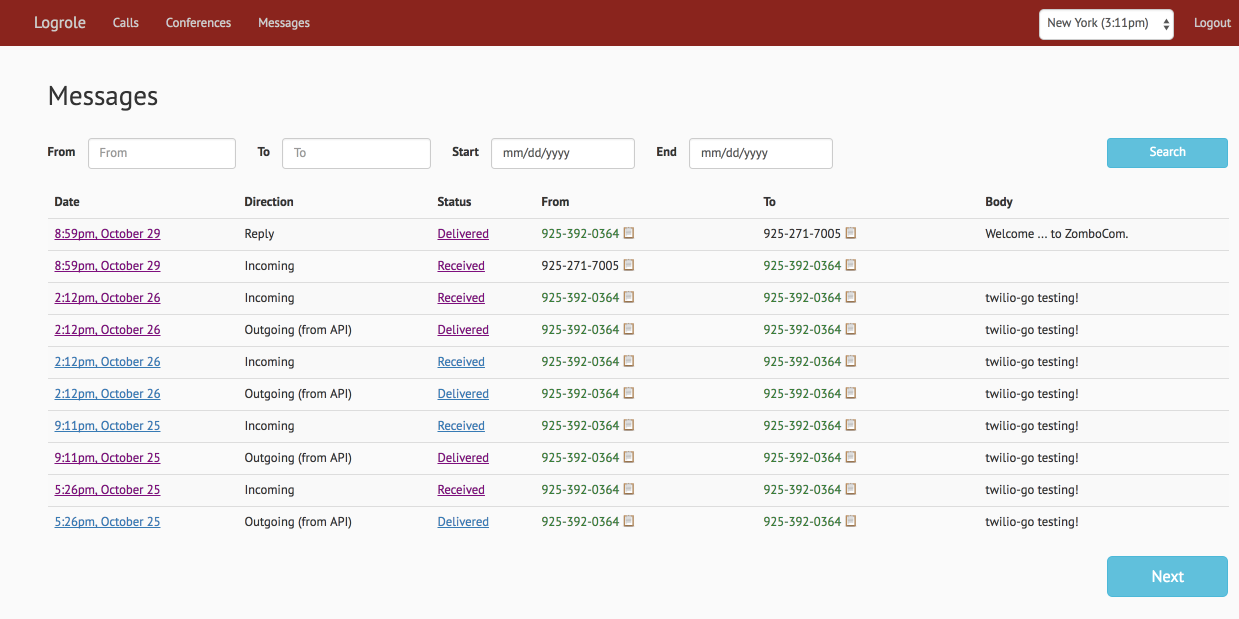Logrole is a faster, usable, fine-grained client for exploring your Twilio logs. If you need to search your Twilio Logs, this is the tool you should be using.
-
Customizable permissions for each user browsing the site - limit access to SMS/MMS bodies, resources older than a certain age, recordings, calls, call from, etc. etc.
-
To-the-hour, timezone-aware resource search, specific to each user.
-
Account Sid and image/recording URLs are hidden from end users at all times, and MMS/recordings require specific permissions to access.
-
Click-to-copy sids and phone numbers.
-
Tab to search: start typing the URL in the tab bar, then press <tab>. Paste any SID to immediately jump to that page.
Logrole fetches and caches the first page of every result set every 30 seconds, and any time you page through records, the next page is prefetched and cached before you click on it. This means paging through your Twilio logs via Logrole is significantly faster than viewing results in your Dashboard or via the API! If you don't believe me, the request latencies are displayed at the bottom of every page; they're frequently 10ms and very rarely above 200ms.
Logrole uses hand-written HTML, one CSS file, one font, and close to no Javascript, so render times and memory performance are very good.
If you need to search your Twilio Logs, this is the tool you should be using.
Read more about what makes Logrole fast.
To install Logrole, run
go get -u github.com/saintpete/logrole/...You will need a working Go environment; I recommend setting the
GOPATH environment variable to $HOME/go in your .bashrc or equivalent.
export GOPATH="$HOME/go"The vendor directory contains a list of dependencies (and suggested versions)
in vendor/vendor.json. To download these into your vendor directory, run
make deps. You can also use go install ./... to download the latest version
of every dependency into the normal place in your $GOPATH.
There are two main ways to deploy Logrole. Either:
- Write all settings to a
config.ymlfile (a sample is in config.sample.yml), then runlogrole_server --config=config.yml.
Or:
- Set all configuration as environment variables. Run
logrole_write_config_from_env > config.ymlto write all those environment variables to a config.yml file. Follow the steps in (1).
For more information, please see the Settings documentation.
Logrole supports three authentication modes: none, basic auth, and Google OAuth. For more information, see the Settings documentation.
Logrole is written in Go; you'll need a working Go environment running at least Go 1.7. Follow the instructions here to set one up: https://golang.org/doc/install.
To check out the project, run go get -u github.com/saintpete/logrole/....
To start a development server, run make serve. This will start a server on
localhost:4114.
By default we look for a config file in config.yml. The values for this
config file can be found in the FileConfig struct in config/settings.go.
There's an example config file at config.sample.yml.
Please run the tests before submitting any changes. Run make test to run the
tests, or run make race-test to run the tests with the race detector enabled.
Run make docs.
Logrole is available as a library, which means the vendor folder is
shipped empty. A suggested set of dependency versions is available in
vendor/vendor.json. To download these dependencies to your project, run
govendor sync.
The Twilio Dashboard displays Participants for completed Conferences, but this functionality is not available via the API. Please contact Support to request this feature if you'd like it to be available in Logrole.
The Start/End date filters may only work in Chrome.

